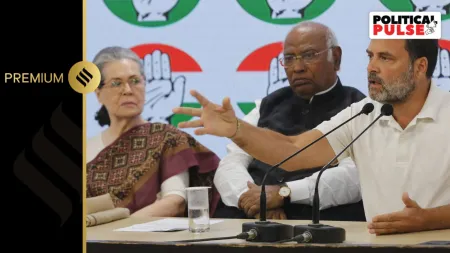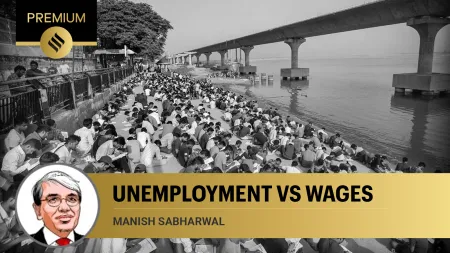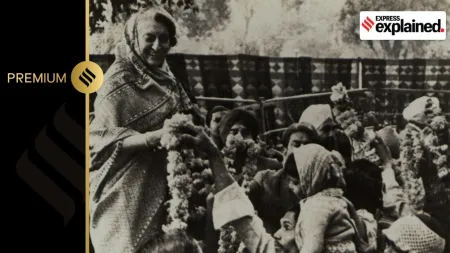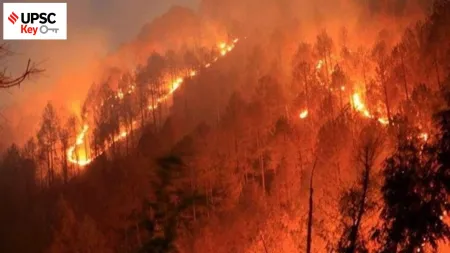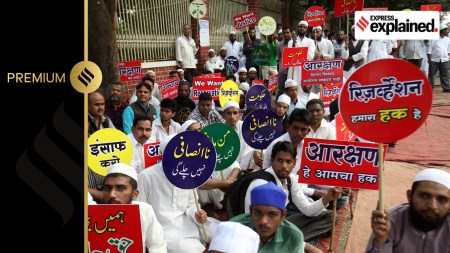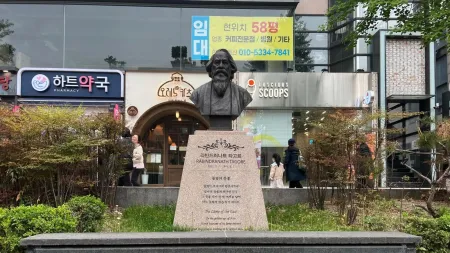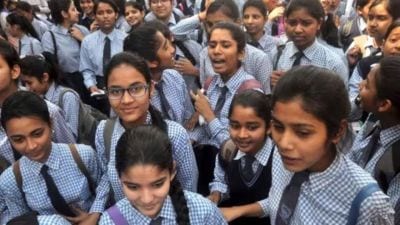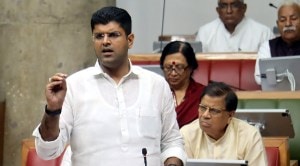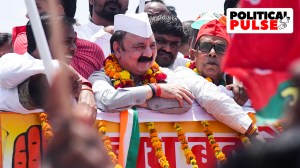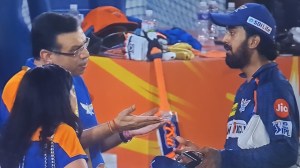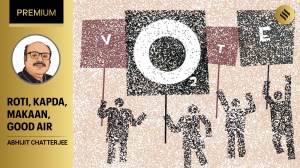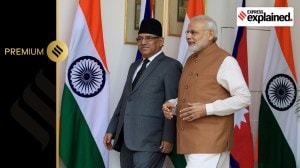- India
- International
It is time for digital leaders to flatten the curve of the infodemic
It is about time, Mark Zuckerberg (Facebook/WhatsApp), Sundar Pichai (Google/YouTube), Jack Dorsey (Twitter) and Zhang Yiming (TikTok) made some tough calls, much like what their own political leaders have done.
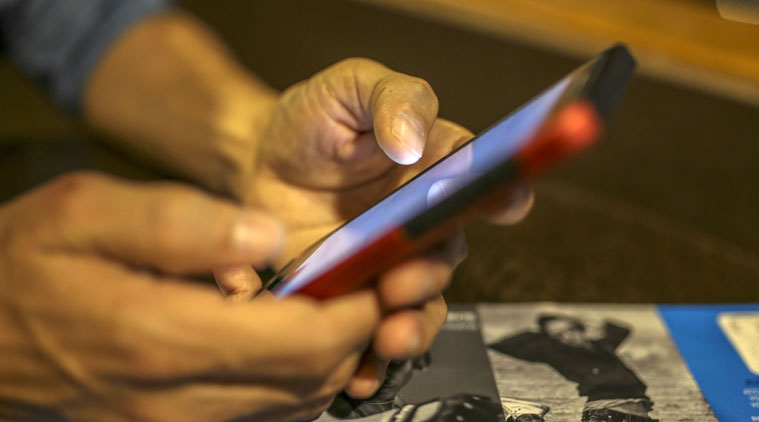 If there ever was a time to demonstrate vision and leadership, this is the time for the digital leaders to flatten the curve of the infodemic before it flattens the most vulnerable populations on the planet. (Source: Bloomberg)
If there ever was a time to demonstrate vision and leadership, this is the time for the digital leaders to flatten the curve of the infodemic before it flattens the most vulnerable populations on the planet. (Source: Bloomberg)
As India, howsoever unevenly, practises social distancing, it may not be such a bad idea to practise some social media distancing as well. The reality is that the “infodemic” — an over-abundance of noxious or false-but-benign and occasionally useful information on COVID-19 — has hit the country much harder than the pandemic itself. For now. Ordinarily, you could say that a few sensationalist messages or useless but harmless remedies on WhatsApp do not hurt anyone — a good “time pass” for stressful times.
Here is why the infodemic can be deadly. In a country such as India, where 400 million turn to a single messaging app for sharing news and stories about any and everything, more than 240 million are on Facebook and, often, using it as the predominant source of news, a critical mass of misinformation leads to mis-directed behaviours. Wrong behaviours propel the pandemic, the right ones can slow its spread. A steep rise of infections will overwhelm the healthcare systems almost immediately. It is essential to get ahead of the digital virus because if the biological virus hits India with the force with which it has arrived elsewhere, the outcomes will be catastrophic. It is clear from the varied experiences between South Korea and Italy, that small changes in behaviours can have enormous consequences. Italy, for all its problems, had 4.1 doctors per 1,000 people in 2017; India had 0.8 per 1,000. Now is the time in India to make those small changes.
Like many of you who are reading this, I am on one too many WhatsApp groups. Usually, I let the messages accumulate, as my personal form of social media distancing. Despite that, it is hard to ignore some dominant narratives: Bioweapons origins of the coronavirus (false); Bill Gates was behind it (false); UNICEF’s recommendations for warding off infection (unauthorised). I am aghast at how much currency the Misinformer-in-Chief in the White House, has got on these groups.
Of course, we, as users, have a responsibility to find better ways to seek advice or substitutes for that dopamine rush of sharing a message instantly liked, commented on and shared by others. However, as a society, much like our global response to the coronavirus, we cannot rely on bottom-up decisions. We need decisive leadership from the top. In the digital nations we inhabit, Facebook, Facebook-owned WhatsApp, YouTube, Twitter, TikTok, it is imperative that the leaders of these nations act – and act now.
It is about time, Mark Zuckerberg (Facebook/WhatsApp), Sundar Pichai (Google/YouTube), Jack Dorsey (Twitter) and Zhang Yiming (TikTok) made some tough calls, much like what their own political leaders have done. For Messrs Zuckerberg, Pichai and Dorsey, their home state of California was the first in the US to go under a lockdown. For Zhang, his home country of China was the first in the world to go under a lockdown. Wouldn’t it be reasonable for the heads of these digital domains to follow California’s Gavin Newsom and China’s Xi Jinping and consider their own versions of a lockdown? This means maintaining a system of fact-checking and tough standards regarding COVID-19 and weeding out messages, hashtags and transmitters that fail to meet them.

For the American social media companies, this could be their moment of redemption after years of being pilloried as “surveillance capitalists” and a menace to society, but they have a narrow window to get it right. Facebook, Google/YouTube and Twitter, have been playing catch-up after failing to catch misinformation at the get-go. Facebook, to its credit, has, uncharacteristically, been a few steps ahead of the others. It has fact-checkers and takes down content that fails their tests; the others don’t. That said, despite all of Facebook’s good intentions, its sibling, WhatsApp, the most powerful digital virus-spreader in India, is largely ungoverned; it is a private messaging app and has end-to-end encryption. Other than a subtle message in light grey that says “Forwarded”, which means little to most users, there are no real warnings that, say, hydrating, blow drying your mouth and yoga asanas will not actually kill the coronavirus; complacency created by these actions could end up killing you instead.
Wouldn’t it be more useful if instead of a coy “Forwarded” note, WhatsApp had a note that said, “For Reliable Medical Advice, Check Out the WHO” or some other trustworthy medical authority? A little clunky? This is not the time to be fussy about the aesthetics of one’s WhatsApp feed.
Speaking of clunky design, let’s talk about YouTube. The platform did try to compensate for the quacks and cranks who populate the platform by placing a link to an authoritative organisation, such as the WHO, below the video, with the organisation’s logo. This, frankly, is a terrible design choice on the part of a company based in in the backyard of Stanford, considered the home of “design thinking”.
Consider the widely-viewed videos from Baba Ramdev, yogi and ayurvedic capitalist extraordinaire. He claims to have invented Ashwagandha, that “doesn’t allow blending of corona protein with human protein.” He also has scientifically unproven tests for the coronavirus and yoga asanas that can help stave it off and myriad other sagely advice. Collectively, this collection of advice and products could prove more harmful than utterly bizarre claims that many might write off. YouTube attaches a link to an authoritative logo below the yogi’s videos. The result: To the average user you watch Baba Ramdev offering advice and the video seems like it has been given legitimacy by an internationally recognised healthcare authority. What were the geniuses at Google thinking?
Twitter, for its part, keeps updating its policies for what it will and will not allow. The result is an inconsistent policy that leaves room for Elon Musk, @elonmusk, founder of Tesla and SpaceX, to tweet to 32.7 million followers that children are immune to the coronavirus (false). As for the room it has created for @realDonaldTrump with 75 million followers for spreading misinformation. let’s not even go there.
Here is the bottom line: Social distancing has direct economic costs. We can see a global economy melting down in front of our eyes. Social media distancing has costs as well — mostly in the form of some added boredom for users and some lost ad revenues for the platforms.
So, Mark, Sundar, Jack, and Zhang, it is time to step up and help us all practise social media distancing by enforcing stricter standards. Beyond India, the entire developing world relies on your platforms for news about the pandemic. If there ever was a time to demonstrate vision and leadership, this is the time for the digital leaders to flatten the curve of the infodemic before it flattens the most vulnerable populations on the planet.
This article was first published in the print under the title “Social media distancing.” The writer is Dean of Global Business at The Fletcher School at Tufts University, founding executive director of Fletcher’s Institute for Business in the Global Context and a non-resident senior fellow of Brookings India.
Here’s a quick Coronavirus guide from Express Explained to keep you updated: What can cause a COVID-19 patient to relapse after recovery? | COVID-19 lockdown has cleaned up the air, but this may not be good news. Here’s why | Can alternative medicine work against the coronavirus? | A five-minute test for COVID-19 has been readied, India may get it too | How India is building up defence during lockdown | Why only a fraction of those with coronavirus suffer acutely | How do healthcare workers protect themselves from getting infected? | What does it take to set up isolation wards?
EXPRESS OPINION
More Explained
May 09: Latest News
- 01
- 02
- 03
- 04
- 05


